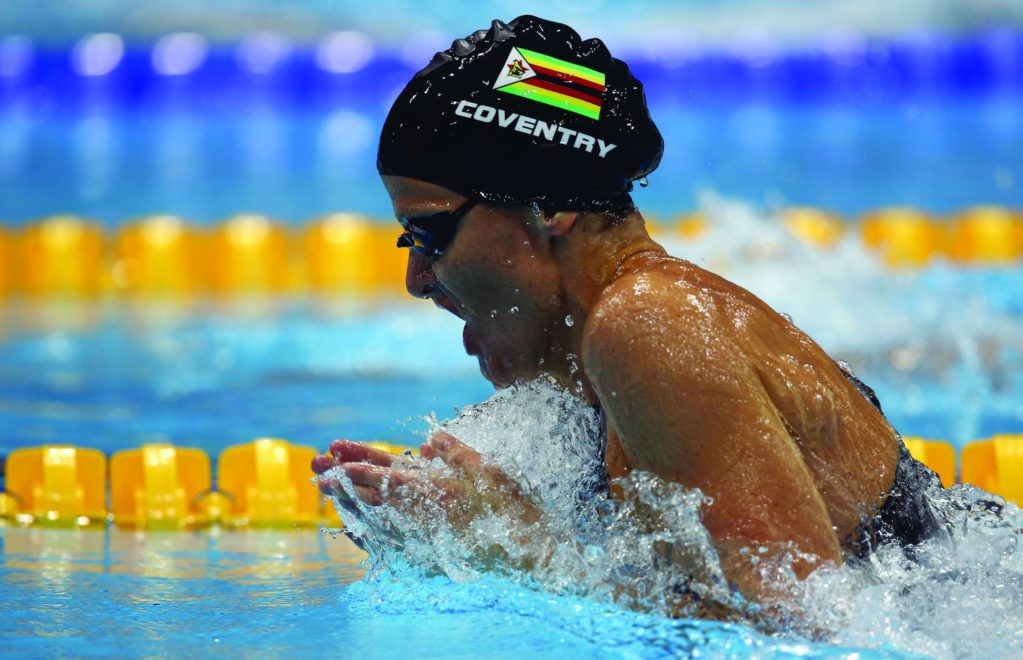International countries are guilty of having misconceptions about Africa but we are guilty about of the same thing with our own countries. When you hear about the Olympics, your thoughts undoubtedly go to the United States’ basketball team or Usain Bolt. You probably wouldn’t think about Zimbabwe or believe that this landlocked country in Southern Africa has been successful in swimming. Why would it, Africa can’t swim, or can it?
Coming from Africa means we have to work harder to get noticed and work longer to succeed. I have been swimming against this current for over a decade.
We give more recognition to the first-world athletes than our own. We have had to work harder, with less, yet when we succeed the scales are still not tipped in our favour. We are always looking away from Africa because we believe the grass is greener on the other side.

LONDON, ENGLAND – JULY 27: Kirsty Coventry of the Zimbabwe Olympic swimming team carries her country’s flag during the Opening Ceremony of the London 2012 Olympic Games at the Olympic Stadium on July 27, 2012 in London, England. (Photo by Lars Baron/Getty Images)
In 2012, while at lunch with Econet Wireless’ Strive Masiyiwa, I asked him where I should focus my business of swimwear apparel. He responded by quoting Booker T Washington.
“A ship lost at sea for many days suddenly sighted a friendly vessel. From the mast of the unfortunate vessel was seen a signal: ‘Water, water. We die of thirst.’ The answer from the friendly vessel at once came back: ‘Cast down your bucket where you are.’ A second time, the signal, ‘Water, send us water!’ went up from the distressed vessel. And was answered: ‘Cast down your bucket where you are.’ A third and fourth signal for water was answered: ‘Cast down your bucket where you are.’ The captain of the distressed vessel, at last, heeding the injunction, cast down his bucket and it came up full of fresh, sparkling water from the mouth of the Amazon River.”
Washington helped unite our races by fighting against white discrimination. Masiyiwa’s point was what we need is right here. It wasn’t easy back then and it’s certainly not easy now but as history has proved, it does become easier with concerted effort.
Three pillars that have given me strength in the battle against this current are perseverance, sacrifice and self-belief.
Perseverance is working hard all the time. Sacrifice is giving something up to accommodate the scarce resources of time and money. Self-belief is having faith in what you do and why you do it. It also makes sacrifice and perseverance worthwhile.
These are not things you write down and plan to do on a Monday morning. This is your ethos; it becomes your lifestyle.
Planning to be successful is important; you cannot simply believe you are going to be successful – no matter what books you might read. You have to implement your plans and it starts by setting goals. Goals should not be easy to attain but must be realistic.
When I was nine years old, I told my parents I wanted to go to the Olympics. They explained the necessity of goals as though it was a ladder; each rung you grab onto doesn’t make things easier but brings you closer to the top. The higher you get, the more difficult things become because the more people will be watching you and the more you have to balance. This balancing act is responsible for the necessary changes you will need to make.
At each Olympic Games I swam in, I had to set goals.
I qualified for the Sydney Olympics in 2000 when I was 16, but then needed a new goal: to make the finals. I only made the semi-finals but this was further than any Zimbabwean swimmer had gone before. I set myself new goals and created a plan to get there.
At Athens in 2004, I wanted to win a medal. I needed proper training facilities and a strong team. I couldn’t afford this on my own but was offered a scholarship by Auburn University in Alabama. I hated being away from home but I knew sacrifices had to be made. I worked hard over the next four years and finally won one gold, one silver and one bronze. I was not alone celebrating my victory; I was joined by 13 million Zimbabweans. This is when I realized the importance sport plays in a country – Zimbabwe was united under the flag I was holding on the podium in Greece.
New goals were set for the Beijing Olympics in 2008 but this time I wanted to win four gold medals. Most swimmers don’t even swim this many events, so I might have been a little unrealistic. I won one gold and three silvers. I was a little disappointed but I needed to adjust my thinking.
During the London Games in 2012, I wanted to become the greatest individual female swimmer in Olympic history by winning one more medal. Four months before the event, I dislocated my patella and then got pneumonia. I had to change my goals. All I wanted to do now was reach my fourth Olympic Games. Perseverance, sacrifice and self-belief ensured I made it to London. I never achieved my initial goal but I made the finals, finishing sixth in two of my races.
The Rio Olympics are next year. My goal hasn’t changed. I still want to become the greatest individual female swimmer in Olympic history.
There is a huge amount of potential in Africa but by focusing on higher profile things we are creating a current we have to fight against. We need to wake up and start celebrating what we are accomplishing and using this wave to progress further.
